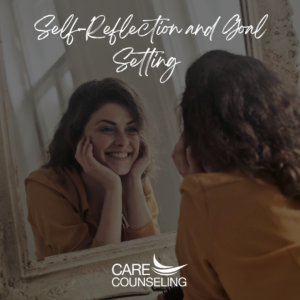Self-Reflection and Goal Setting as Summer Ends
 As the warmth of summer gradually gives way to the crispness of fall, we find ourselves at a natural juncture for self-reflection and goal-setting. The changing seasons serve as a reminder that life, much like nature, is a cycle of growth, transformation, and renewal. As August ends, now is the perfect time to engage in introspection, evaluate your accomplishments, and chart a course for the months ahead. By embracing this season of change, you can harness its energy to propel yourself toward personal growth and fulfillment.
As the warmth of summer gradually gives way to the crispness of fall, we find ourselves at a natural juncture for self-reflection and goal-setting. The changing seasons serve as a reminder that life, much like nature, is a cycle of growth, transformation, and renewal. As August ends, now is the perfect time to engage in introspection, evaluate your accomplishments, and chart a course for the months ahead. By embracing this season of change, you can harness its energy to propel yourself toward personal growth and fulfillment.
The Power of Self-Reflection
Self-reflection is an invaluable tool for gaining insight into your experiences, choices, and emotions. It involves taking a pause from the busyness of life to look inward and contemplate the journey you’ve undertaken over the past few months. As you reflect on your summer adventures, challenges, and achievements, consider the following:
Acknowledge Achievements
Begin by celebrating your successes, no matter how big or small. Reflect on the goals you set at the beginning of summer—did you accomplish them? Even if you didn’t achieve everything on your list, recognize the strides you’ve made and the growth you’ve experienced.
Lessons Learned
Every experience offers an opportunity for learning. Take time to examine any setbacks or difficulties you faced during the summer. What lessons did they hold? How can you use these lessons to make more informed decisions in the future?
Gratitude and Appreciation
Express gratitude for the positive moments and experiences that have enriched your summer. Gratitude has the power to shift your perspective and enhance your overall sense of wellbeing.
Values and Priorities
Reflect on whether your activities and choices aligned with your values and priorities. Did you spend time on what truly matters to you? Are there adjustments you’d like to make moving forward?
Transitioning from Reflection to Goal Setting
Once you’ve embraced self-reflection, it’s time to channel that clarity into effective goal-setting. As you prepare for the upcoming months, consider the following steps to guide your goal-setting process:
Define Your Intentions
Begin by clarifying your intentions for the coming months. What do you hope to achieve? Whether it’s personal growth, career advancement, improved health, or enhanced relationships, be specific about your intentions.
Set SMART Goals
Create goals that are Specific, Measurable, Achievable, Relevant, and Time-bound (SMART). This framework provides a structured approach to goal setting, helping you set clear and attainable objectives.
Prioritize and Focus
While it’s tempting to create an extensive list of goals, it’s more effective to focus on a few key areas. Prioritization allows you to direct your energy and efforts toward what truly matters to you.
Break Down Goals
Break down larger goals into smaller, actionable steps. This approach makes your goals more manageable and increases your sense of accomplishment as you make progress.
Cultivate Adaptability
Life is unpredictable, and circumstances may change. Embrace adaptability by remaining open to adjusting your goals as needed. Flexibility ensures that you can navigate challenges while staying committed to your aspirations.
Embrace the Beauty of Change
As summer transitions to fall, it’s important to recognize that change is a constant and natural part of life. Just as trees shed their leaves to prepare for winter, we too can shed old habits, beliefs, and patterns that no longer serve us. By engaging in self-reflection and goal setting, you’re actively participating in your own growth and evolution.
The cycle of the seasons teaches us that each phase has its unique beauty and purpose. Embrace this transition as an opportunity for renewal and growth. As you set your intentions and move forward with your goals, remember that the journey itself is just as important as the destination. Allow yourself to savor the process, celebrate your progress, and embrace the transformative power of self-awareness.
By engaging in self-reflection, setting meaningful goals, and nurturing our personal growth, we can navigate the upcoming months with purpose and clarity. Just as the leaves fall, making way for new growth, so too can we shed the old to make room for the new. Let the spirit of the changing seasons inspire you to become the best version of yourself as you embark on this journey of self-discovery and transformation.



























